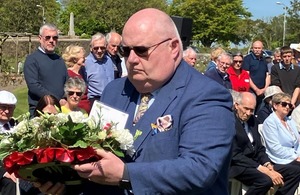International Holocaust Remembrance Alliance Chair visits Jersey for Liberation Day
Lord Pickles visited Jersey from 8 to 10 May 2024 to mark Liberation Day, the end of Jersey’s occupation by Nazi forces during World War 2.

Lord Pickles laying a wreath during his visit.
This page relates to a visit that took place from 8 to 10 May 2024, during the 2022 to 2024 Sunak Conservative government, and was published later.
Key to the UK’s Presidency of the International Holocaust Remembrance Alliance (IHRA) was the visit by Lord Pickles to Jersey to take part in Liberation Day. The Channel Islands were the only part of Britain to be occupied by the Nazis during the Second World war. Liberation Day marked the end of almost 5 years of occupation by Nazi forces during World War 2. Jersey was liberated by British troops on 9 May 1945, the day after VE Day, which saw an end to the hostilities in Europe.
This year, Lord Pickles in his capacity as chair of the International Holocaust Remembrance Alliance took part in the annual commemorations. This included a dinner hosted by the Bailiff of Jersey at the Old Library, Royal Court House, St Helier, and the re-enactment of Liberation Day around Liberation Square, where crowds gathered in 1945 to welcome British troops and watch them unfurl the Union Jack from the balcony of the Pomme d’Or Hotel.
This was followed by solemn service at the Slave Workers’ Memorial at Westmount, a memorial that remembers the thousands of slave and enforced workers who suffered at the hands of the German forces. The service was hosted by Gary Font, the son of a Spanish Civil War fighter who was forced into slave labour in Jersey. Lord Pickles laid a wreath at the Slave Workers’ Memorial with the following message: ‘In memory of all foreign labourers who died during the Nazi occupation of the Channel Islands and remembering those that suffered and survived’.
Lord Pickles also hosted and spoke at a panel discussion on 10 May 2024, entitled ‘ The Memory of Forced and Slave Labour in the Channel Islands’. Speakers included:
- Dr Paul Sanders (NEOMA Business School, France)
- Martha Bernstein (Jersey Jewish Congregation)
- Sarah Buckingham (Jersey Heritage), and
- Gary Font (spokesperson for forced and slave labourers in Jersey)
The panel was chaired by Dr Gilly Carr (University of Cambridge).
There was a broad discussion on ensuring we remember the victims of slave and enforced labour on the Channel Islands. Hope was expressed that the upcoming Alderney Review would name victims and thus give them lasting dignity.
Dr Carr asked Lord Pickles why is it so important for us to remember forced and slave workers in the Channel Islands? He said:
The camps in Alderney were significant in the history of the Holocaust not just because they were sited on British soil but also because there had been considerable speculation in recent years over numbers of individuals murdered by the conditions in the camps.
Lord Pickles went on to say that:
Numbers matter because the truth matters. The dead deserve the dignity of the truth; the residents of Alderney deserve accurate numbers to free them from distortion. Exaggerating the numbers of the dead, or even minimising them, is in itself a form of Holocaust distortion and a critical threat to Holocaust memory and to fostering a world without genocide.
Lord Pickle went on to say that he hoped the review which will be published on 22 May will put to rest theories on numbers and provide lasting dignity to the dead and some peace to the residents of Alderney who continue to remember them at the Hammond War Memorial every year in May.

Lord Pickles with the discussion panel.
Other key themes emerging from the panel discussion was the desire for good educational programmes in schools to tie that in with authentic sites in the island. Westmount, for example, has no information board and yet it is the place where forced and slave labourers were buried during the occupation and where Spanish Republican survivors who stayed in the island held their own annual memorial which continues today.
The audience, many of whom represented the education, heritage and survivor communities, engaged with the panel and discussed how the history of slave and enforced labourers should be remembered and how it should be part of the education offer.
Lord Pickles ended his visit to Jersey with a Shabbat dinner with the Jewish community where concerns were raised about the rising levels of antisemitism across the UK especially on university campuses and recent Pro-Palestinian demonstrations in Jersey. He reassured the Jewish community of Jersey that better days will come.